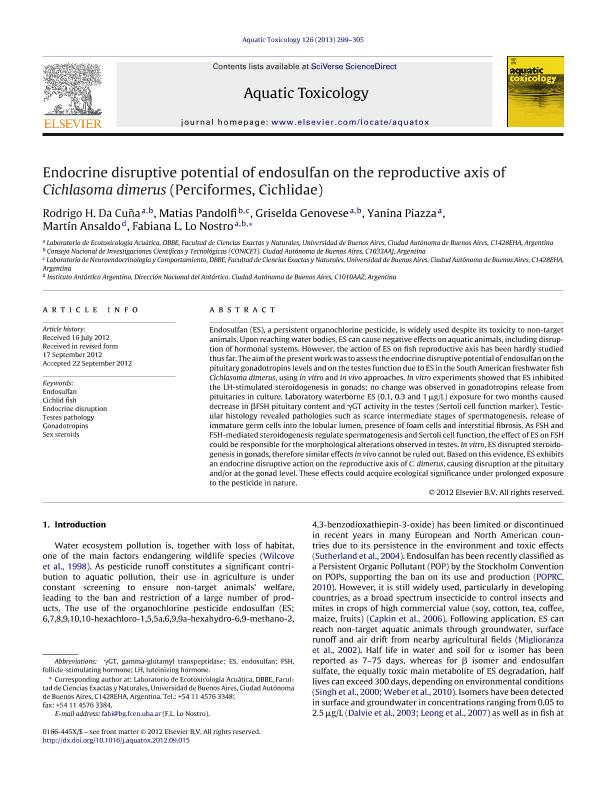Artículo
Endocrine disruptive potential of endosulfan on the reproductive axis of C. dimerus (Perciformes, Cichlidae)
Da Cuña, Rodrigo Hernán ; Pandolfi, Matias
; Pandolfi, Matias ; Genovese, Griselda
; Genovese, Griselda ; Piazza, Yanina Grisel
; Piazza, Yanina Grisel ; Ansaldo, Martín; Lo Nostro, Fabiana Laura
; Ansaldo, Martín; Lo Nostro, Fabiana Laura
 ; Pandolfi, Matias
; Pandolfi, Matias ; Genovese, Griselda
; Genovese, Griselda ; Piazza, Yanina Grisel
; Piazza, Yanina Grisel ; Ansaldo, Martín; Lo Nostro, Fabiana Laura
; Ansaldo, Martín; Lo Nostro, Fabiana Laura
Fecha de publicación:
01/2013
Editorial:
Elsevier Science
Revista:
Aquatic Toxicology
ISSN:
0166-445X
Idioma:
Inglés
Tipo de recurso:
Artículo publicado
Clasificación temática:
Resumen
Endosulfan (ES), a persistent organochlorine pesticide, is widely used worldwide despite its toxicity to non-target animals. Upon reaching water bodies, ES can cause negative effects on aquatic animals, including disruption of hormonal systems. However, the action of ES on fish reproductive axis has been hardly studied thus far. The aim of the present work was to analyze the endocrine disruptive potential of endosulfan on the pituitary gonadotropins levels and on the testes function due to ES in the South American freshwater fish Cichlasoma dimerus, using in vivo and in vitro approaches. Waterborne ES (0.1, 0.3 and 1 g/L) exposure for two months caused decrease in FSH pituitary content and GT activity in the testes (Sertoli cell function marker). Testicular alterations such as scarce intermediate stages of spermatogenesis, release of immature germ cells into the lobular lumen, presence of foam cells and interstitial fibrosis, were also observed. In vitro experiments showed that ES inhibited the LH-stimulated steroidogenesis in gonads. As FSH and FSH-mediated steroidogenesis regulate spermatogenesis and Sertoli cell function, the effect of ES on FSH could be responsible for the morphological alterations observed in testes. Direct effects can also be occurring through disruption of steroidogenesis, as observed in vitro. Based on this evidence, ES exhibits an endocrine disruptive action on the reproductive axis of C. dimerus, causing disruption at the pituitary and/or at the gonad level. These effects could acquire greater significance under prolonged exposure to the pesticide in nature.
Archivos asociados
Licencia
Identificadores
Colecciones
Articulos(OCA CIUDAD UNIVERSITARIA)
Articulos de OFICINA DE COORDINACION ADMINISTRATIVA CIUDAD UNIVERSITARIA
Articulos de OFICINA DE COORDINACION ADMINISTRATIVA CIUDAD UNIVERSITARIA
Citación
Da Cuña, Rodrigo Hernán; Pandolfi, Matias; Genovese, Griselda; Piazza, Yanina Grisel; Ansaldo, Martín; et al.; Endocrine disruptive potential of endosulfan on the reproductive axis of C. dimerus (Perciformes, Cichlidae); Elsevier Science; Aquatic Toxicology; 126; 1-2013; 299-305
Compartir
Altmétricas



